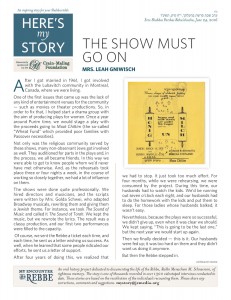The Show Must Go On
After I got married in 1961, I got involved with the Lubavitch community in Montreal, Canada, where we were living.
One of the first issues that came up was the lack of any kind of entertainment venues for the community – such as movies or theater productions. So, in order to fix that, I helped start a drama group with the aim of producing plays for women. Once a year around Purim time, we would stage a play with the proceeds going to Maot Chittim (the so-called “Wheat Fund” which provided poor families with Passover necessities).
Not only was the religious community served by these shows, many non-observant Jews got involved as well. They auditioned for parts in the plays and, in the process, we all became friends. In this way we were able to get to know people whom we’d never have met otherwise. And, as the rehearsals took place three or four nights a week, in the course of working so closely together, we had a lot of influence on them.
The shows were done quite professionally. We hired directors and musicians, and the scripts were written by Mrs. Golda Schwei, who adapted Broadway musicals, rewriting them and giving them a Jewish theme. For instance, we took The Sound of Music and called it The Sound of Torah. We kept the music, but we rewrote the lyrics. The result was a classy production, and our first two performances were filled to the capacity.
Of course, we sent the Rebbe a ticket each time, and each time, he sent us a letter wishing us success. As well, when he learned that some people ridiculed our efforts, he sent us a letter of support.
After four years of doing this, we realized that we had to stop. It just took too much effort. For fourth months, while we were rehearsing, we were consumed by the project. During this time, our husbands had to watch the kids. We’d be running out seven o’clock each night, and our husbands had to do the homework with the kids and put them to sleep. For those ladies whose husbands balked, it wasn’t easy.
Nevertheless, because the plays were so successful, we didn’t give up, even when it was clear we should. We kept saying, “This is going to be the last one,” but the next year we would start up again.
Then we finally decided – this is it. Our husbands were fed up; they didn’t want us doing it anymore.
But then the Rebbe stepped in.
Here’s what happened:
Three months before Pesach, around the time we would usually start the production, I happened to be in New York and I had an audience with the Rebbe.
Of course, he asked me, “Are you going to put on a play this year?”
“Unfortunately, I don’t think so,” I answered, “because the women’s husbands are too tired.”
The Rebbe looked at me and said, “You go back and tell these husbands that they must do whatever is necessary, and you have to make sure that the play takes place this year.”
I got the message. I went back, called the women together and said, “The Rebbe wants us to put on the play this year. This is not coming from me, but from the Rebbe. So, you have to tell your husbands that they’re going to have to deal with the Rebbe if they don’t agree.”
Of course, nobody argued, and we went forward. We worked like crazy. We put the production together in eight weeks, and it was very successful. Needless to say, the Rebbe was very happy, and he sent me a check for thirty-six dollars that year for the Maot Chittim.
We staged the plays for ten consecutive years until I took ill and I couldn’t organize them anymore. The Rebbe never asked me about it again.
But I would like to tell a story about another instance when the Rebbe encouraged me to carry on even though it was tough.
There came a time, many years later, when my son was getting married to a girl from South Africa. Looking forward to this happy event, we booked tickets on El Al, flying from New York via Tel Aviv to Johannesburg.
Now this took place in 1991, during the Gulf War, and our future daughter-in-law’s father was very nervous about us flying through Israel, which was then enduring constant scud-missile attacks from Saddam Hussein. So he called and asked us to book a ticket on British Airways instead. He was not the only one. Several of our non-Jewish friends tried to persuade us to cancel our tickets, and even the El Al representative offered to book us on another airline so that we could circumvent Israel.
Although we still wanted to fly through Israel, we decided to ask the Rebbe if this was a wise thing to do.
A week before our trip we went to see the Rebbe while he was distributing dollars for charity, and I took this opportunity to tell him about our travel plans, and to ask him for a blessing for a safe trip.
The Rebbe said, “Israel is the safest place in the world. It is the place ‘the eyes of the L-rd are upon from the beginning of the year until the end.’ Therefore, there is no reason to worry.” In addition to that, he gave us all an extra dollar to give to charity in Israel.
Needless to say, we stayed course, and the trip was a successful and a happy one.
Mrs. Leah Gniwish is the founder and CEO of Delmar Jewelers International and has been named Vendor of the Year by Zales in Canada. She was interviewed in her home in Montreal, Canada in January of 2011.
:This week’s Here’s My Story is generously sponsored
In honor of the Rebbe
and Lezchus our children and grandchildren
By Anonymous





